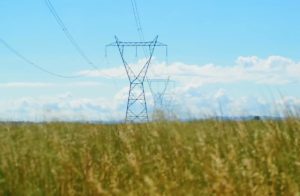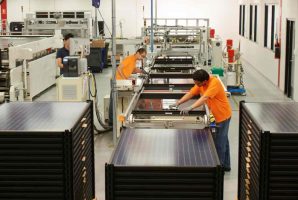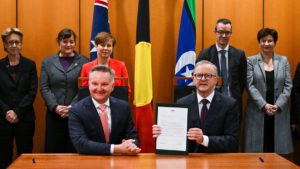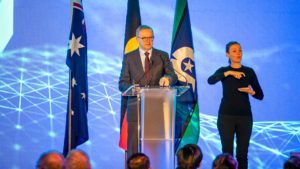The fall-out of the 2019 election result on climate and energy policy in Australia will play out over coming months, or years, but the defeated Australian Labor Party faces a more immediate decision over its leadership and direction.
Senior Labor figures are working hard to show that the leadership is not a factional issue, and the result of this is that Anthony Albanese appears to be running effectively uncontested for the leadership role.
Labor Right faction stalwart Chris Bowen nominated for the leadership contest, but following a flurry of endorsements from senior colleagues for Albanese, Bowen is expected to withdraw from the contest just a day after nominating.
Upon the withdrawal of Bowen, Albanese is expected to be endorsed as leader by the Labor caucus by the end of the week.
Likely @AlboMP will be confirmed as Labor Leader at special caucus meeting on Friday. National Executive meeting tonight to decide process. #auspol #7News
— Mark Riley (@Riley7News) May 22, 2019
The change in the Labor leadership will also provide a signal for the future of the party’s climate and energy policies, and whether Labor under a leader like Albanese will maintain its ambitious plans for climate action, or whether it retreats to a slower, incremental approach.
Labor had tried to capitalise on the Coalition’s lack of substantive climate change policy going into the election, by offering voters an expansive platform that included increased targets for emissions reductions and renewable energy, and a reasonably ambitious plan for electric vehicles.
However, a concerted scare campaign about the claimed costs of Labor’s climate policies – which included the production of almost universally panned modelling by Brian Fisher, and some other extraordinary fear mongering about economic impacts and the “threat” of EVs – and equivocation on the issue of the Adani coal mine undermined Labor’s platform.
One of the great tragedies of this election is the package put forward by Labor, carefully and meticulously put together by climate change spokesman Mark Butler, may risk being lost to the country. Business groups, who have pleaded for policy clarity, were barely heard in the debates over Fisher’s modelling and the benefits of the Labor platform promoted by the likes of Ross Garnaut.
Now, it’s all up for review. Labor’s Right faction will no doubt want to drag the party back towards the “sensible centre”.
Labor Right will want to minimise many of the more ambitious aspects of the Labor platform and instead taking a ‘slow-and-steady’ approach, making its stance on climate change as small a target as possible against attacks conservatives.
“We need to stick to the sensible centre and push reform in an incremental way and in an orderly way and properly explain why change is necessary to people,” senior right faction member Joel Fitzgibbon said when he floated the idea of challenging for the leadership.
Chris Bowen has been relatively quiet on climate policy, and his initial decision to run for the leadership also meant there was no room for finance spokesman Jim Chalmers, who impressively took on climate science denialist ravings of radio shock-jock Alan Jones in this week’s Q&A on ABC TV, and who at least insisted that renewables were cheaper.
However, he did not want to discuss whether Labor’s targets would remain as they are. And he seemed quite happy that Adani, one way or another, would not be an issue at the next election. “Everything is up for grabs,” Chalmers said on Q&A.
Jim Chalmers may still nominate for the leadership contest before nominations close on Thursday.
Labor Left will want to retain its expansive plans for renewable energy investment and emissions reduction targets, but with Anthony Albanese as their preferred leader, there will likely be a greater emphasis on the impacts on jobs and workers.
Both sides will seek to refine the way their energy plans are communicated, with a greater focus on how Labor will support communities through a significant period of transition.
With the looming closure of a several coal-fired power stations over the next few decades, many blue-collar workers will need to transition into new roles. Labor will continued to be pressured by associated unions to articulate what plan it has for this workforce, and this will likely form a core part of its future climate and energy policy platform.
“We need to listen to what the Australian people have said. We need to consider our policies, what we can do better and, as importantly, how we can communicate them better.” Penny Wong said in announcing she would be backing Albanese for the leadership.
Labor changed the way it chooses leaders, after Kevin Rudd was elevated to the Prime Ministership for the second time in 2013 after ousting Julia Gillard.
In an attempt to quash ongoing leadership speculation and the regularity of leadership changes at the time, the method of choosing Labor leaders was split equally between a vote of the party rank-and-file membership and a vote of the parliamentary caucus.
When Bill Shorten won the leadership contest against Albanese in 2013, the result highlighted a split between the Labor rank-and-file membership and the party room.
At the time Albanese was the more popular amongst party members, winning the rank-and-file vote by a 60-40 margin. The result was more than reversed when it came to the Labor caucus vote, with Shorten winning the leadership with the help of a greater share of the party room vote.
This time round, suppport again seems to be quickly rallying around Albanese. Senior shadow cabinet members Penny Wong, Tony Burke and Mark Butler have already expressed support for Albanese. Significantly, some senior members of Labor’s Right faction have also publicly backed Albanese, with Joel Fitzgibbon and former NSW premier Kristina Kenneally expressing support.
“After the election result, we need to reframe our policies, we need to listen to our members and supporters, and we must reconnect with working people who did not vote for us.” Kristina Kenneally said when announcing she would back Albanese for the Labor leadership.
https://twitter.com/KKeneally/status/1131002981787156481
Albanese is by no means a climate change crusader. Before the election, Albanese criticised Stop Adani campaigners as losing sight of the bigger issues of concerns for the community.
However, Albanese has been strongly critical of the Coalition for its poor record on climate change, constrasting the track record of the two parties in a speech to the Maritime industry in the week before the election.
“When Labor was last in Government, we introduced policies to facilitate a transition to a clean energy economy. The Coalition tore them down.” Albanese said.
“It still clings to the fantasy that we can solve all of our environmental challenges by simply planting more trees.”
“We need a Labor Government to get climate policy back on track and restore our international reputation as a nation prepared to play our role in protecting the environment.”
Note: This story has been updated to reflect the expected withdrawal of Chris Bowen from the Labor leadership contest.









